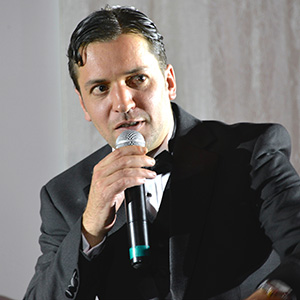

On April 27th, a capacity crowd of 700 paid witness to the world premiere of Nelson Ponta-Garca’s nine-part historical documentary, The Portuguese in California. Unfolding at the IES Hall, right next to the Five Wounds Church—the Portuguese World Capital of San Jose—the event was a grand-scale, Hollywood-style affair, replete with tuxedos, red carpets, multiple step-and-repeats, Portuguese TV and photo crews, food, wine, pastries and live Azorean music.
Panel sessions took place with numerous Portuguese businessmen, dignitaries, artists and producers from across North America. Yannick Djalo, the Portuguese soccer star now on loan with the San Jose Earthquakes, and who had just scored the winning goal the night before, sat in the front row. In textbook San Jose fashion, 99.9 percent of the rest of the city had no idea the event was happening.
The Portuguese first came to this town more than 100 years ago and they arrived in SoCal a few hundred years before that. Since then, they have gone on to play significant roles in various industries from agriculture to high-tech and even politics, all of which is the subject matter for the documentary. Ponta-Garca was born in San Jose, but grew up in Portugal before eventually returning to run his own production company, NPG Productions.
At the event, we watched one entire episode of the series on a projection screen before panel sessions and live music unfolded on the stage. At the end of the evening, slices and snippets of several other episodes were then shown. For the whole package, Ponta-Garca split the story into different geographical sections pertaining to San Diego, Los Angeles, the Bay Area, Sacramento and more, all to chronicle the history of the Portuguese diaspora in vivid detail. In the footage, dozens of persons of Portuguese ancestry, who’ve since achieved success in business, politics and the arts, are interviewed in their native language about their family history, immigration and the Portuguese experience in California. From the origins of the tuna industry in San Diego, through the agriculture business of the Central Valley in the 1900s, all the way up to 21st-century San Jose and Silicon Valley, an entire Portuguese lineage presents itself. Imagine a Ken Burns-style narrative, complete with high-volume History Channel bombast and loads of original photos and footage juxtaposed with modern-day interviews, many of which are local to San Jose and Santa Clara County. It turns out that 90 percent of the Portuguese in California are of Azorean descent.
Nuno Mathias, the Portuguese Consul General in San Francisco, participated in the first panel and praised the uniqueness of the documentary, saying that it represented a historical mark for the Portuguese community in California.
“It will be a reference for years to come,” he declared. “Lately, we’ve been worried, the community is a little on edge regarding how to reconnect with the younger generations. I think this documentary will play an instrumental role. … The younger generations will feel extremely proud about their origins, about their parents, about their families.”
As I watched the episodes, I couldn’t help but agree. The documentary may even serve as a role model for other ethnic projects to come. I can easily see an Italian or Vietnamese equivalent.
Ponta-Garca says it all began when the president of Portugal visited California a few years ago and requested a few segments to showcase parts of the state with a strong Portuguese history. From there, the buzz increased, people wanted more, and the project soon exploded into a global effort. One hundred interviews later, plus endless travel, battles with funders and countless hours of post-production on different continents, the documentary premiered in San Jose, and then went on to Tulare last Friday before it headed off to San Diego.
“They’ve always called us a small, quiet, invisible minority,” says Ponta-Garca. “But the Portuguese have been here for a long time, since Cabrillo. And Antonio Jose Rocha was in LA when it was only 600 people. We’ve been here from day one, almost. But other than Day of Portugal in Kelley Park, there’s been nothing that tells the story.”



